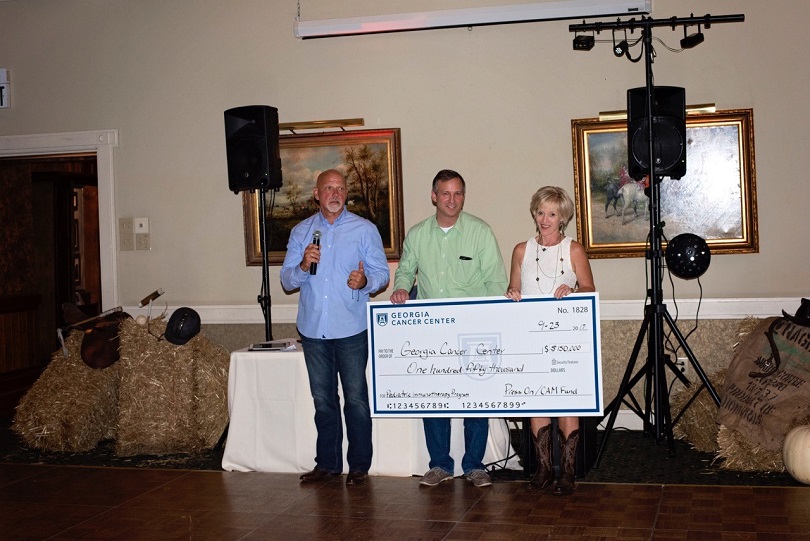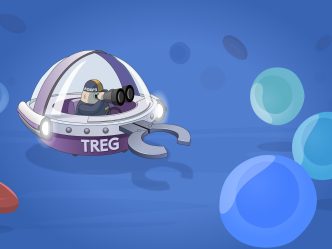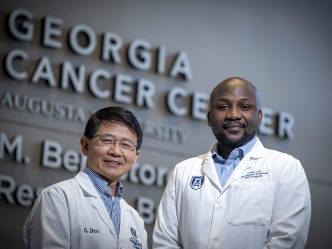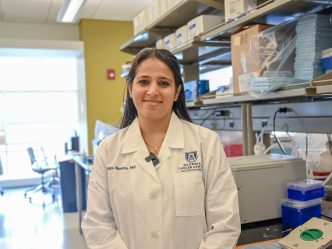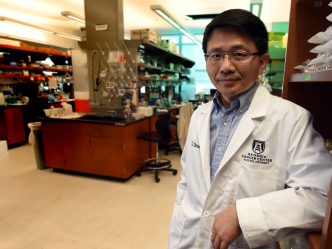What started out as a fun football game at a South Carolina elementary school in October has brought family and friends together to form a circle of support around a child battling an aggressive form of brain cancer.
“I fell unconscious and had to go to the hospital,” 9-year-old Kaiden Morrel said.
Morrel had to have a CT scan at the local hospital in Allendale, South Carolina. His mom, Shay, said doctors saw something suspicious and decided to send her son to the Children’s Hospital of Georgia to have a second CT scan.
“They found something on that scan, too,” Morrel said. “They decided to do an MRI on Kaiden and that’s when they confirmed he had cancer.”
After learning about the diagnosis, Dr. Ted Johnson, associate professor at the Medical College of Georgia, and his team approached the Morrel family to see if they were interested in being part of the clinical trial in the Pediatric Immunotherapy Program.
“Everything went from a blur to ‘Okay, we’ll do whatever that’s hopeful to help Kaiden,’” said Daphne Conner, Kaiden’s aunt. “It wasn’t even a question, if it had a chance to help Kaiden.”
Johnson says a recent donation of $150,000 from the partnership of Press On Foundation and CAM Fund is helping cover the cost of enrolling Morrel in the clinical trial. He is the first Diffuse Intrinsic Pontine Glioma (DIPG) patient to be part of the trial.
“We always planned on enrolling DIPG patients in our clinical trial,” Johnson said. “That was our goal. But we didn’t include these patients in the trial initially due to safety concerns. Now, we are able to handle these kinds of cases with the experience we have.”
In all, 40 pediatric patients with brain tumors are being treated in the program. Two of those patients travel from European countries to Augusta, Georgia, to be treated by Johnson and his team.
“We are turning our attention to up-front treatment with immunotherapy,” Johnson said. “These are patients whose immune systems are as strong as they are ever going to be. Their immune system has not been assaulted by multiple rounds of radiation and chemotherapy.”
Johnson presented what he calls “promising” preliminary data from his clinical research using an IDO-inhibitor, Indoximod, at a pair of conferences in November. The first was at the International Pediatric Neuro-Oncology Conference in Houston, Texas. He also spoke at the annual meeting of the Society for Neuro-Oncology in San Francisco.
Morrel, who received radiation for 28 days straight, finished radiation in early December, and now starts monthly cycles of immune-chemotherapy.
His family says the resources and care they’ve received at the Children’s Hospital of Georgia and the partnership with the Georgia Cancer Center for the Pediatric Immunotherapy Program have been a blessing.
“You don’t’ have to be away from your home and family,” Conner said. “It’s reassuring to be able to get support right here. We have family here in Augusta, so we don’t have to drive 45 minutes to an hour back to Allendale after each visit.”
*Editor’s note: We have an update to share about Kaiden’s latest scan. His aunt, Daphne Conner, says her nephew’s newest PET scan showed no sign of the tumor. The family will continue to follow-up with Dr. Johnson and his team for future monitoring of Kaiden’s condition.
 Augusta University
Augusta University
